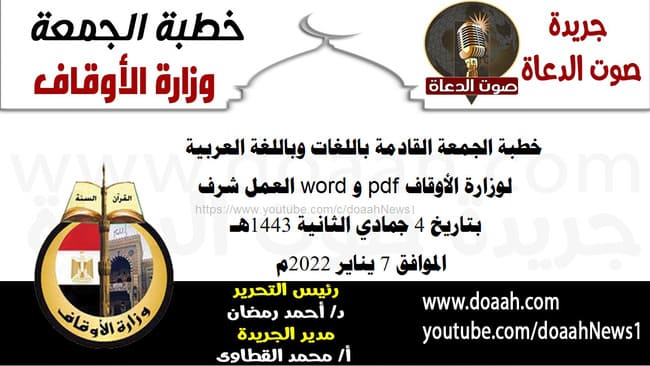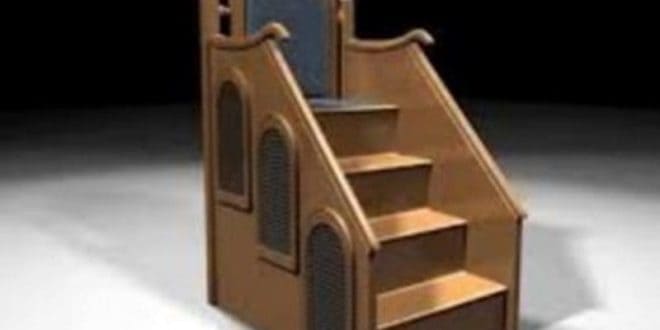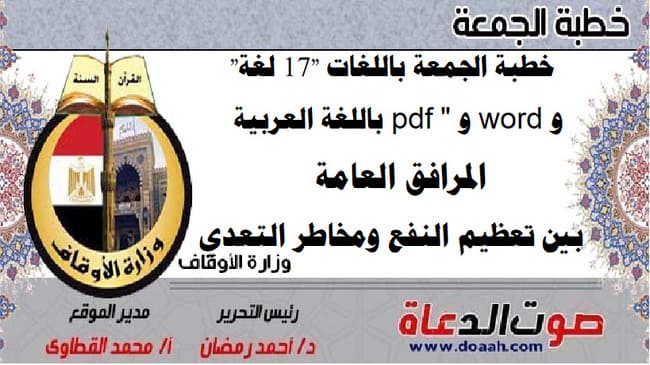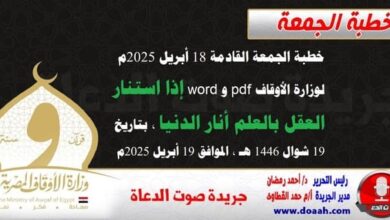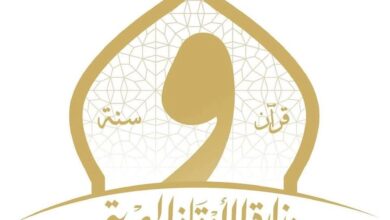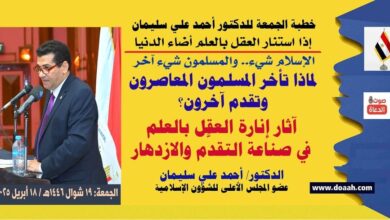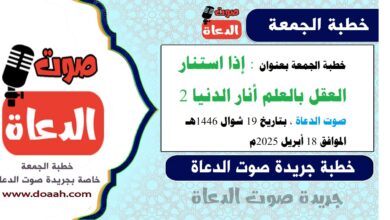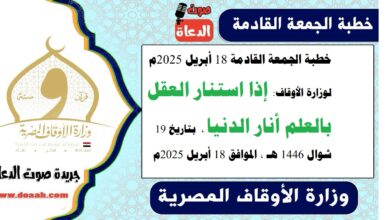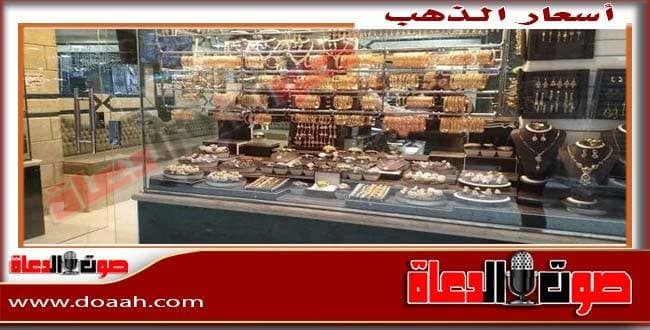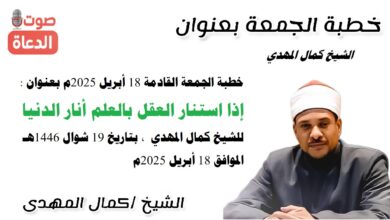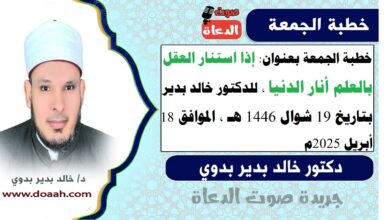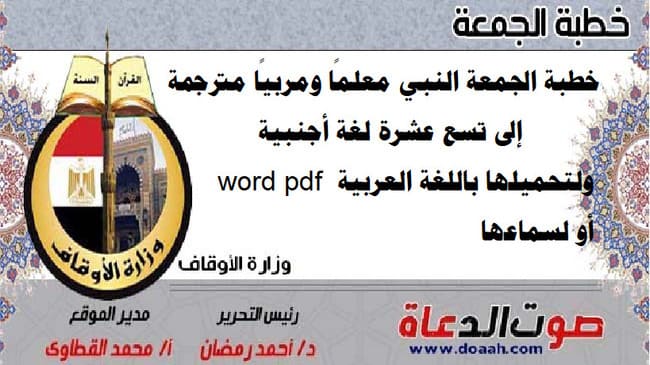Taking Advantage of the Seasons of Worship and Righteaous Deeds

Taking Advantage of the Seasons of Worship and Righteaous Deeds
خطبة الجمعة لوزراة الأوقاف مسموعة باللغة الإنجليزية : اغتنام مواسم الطاعات والخيرات خطبة الجمعة القادمة غرة ذي الحجة ، 2 أغسطس 2019 م ، غرة ذي الحجة 1440 هـ
All praise is due to Allah, the Lord of all worlds, Who says in His Ever Glorious Book, “Hurry towards your Lord’s forgiveness and a Garden as wide as the heavens and earth prepared for the righteous, who give, both in prosperity and adversity, who restrain their anger and pardon people- God loves those who do good.”
I bear witness that there is no god but Allah, and that Muhammad is His Servant and Messenger. May Allah’s Peace and Blessings be upon him, his Household, Companions and upon those who follow their path to the Day of Judgment.
The Almighty Allah has made certain times of the year as seasons in which rewards are multiplied, grades are raise and servants are encouraged to continue their acts of worship. A person of a sound mind is the one who makes use of these occasions, purifies his intention and perfects his deeds of approaching Allah, the Exalted, so that he can receive the Blessings and Mercy of his Lord. The Prophet (PBUH) said, “Verily your Lord has breaths of His Mercy in the days of your time-so expose yourselves to them. Perhaps one of you may get such breath of mercy after which he may not suffer any misery.”
Surely, we are currently witnessing one of the greatest occasions in reward and one of the most virtuous occasions, as the Almighty Allah made the reward of good deeds in these days much higher than the same deeds at any other time. These are honorable days and great times that the Prophet (PBUH) showed us their value and virtue including:
The Almighty Allah made an oath in His Glorious Book, the Qur’an, by these days, saying, “By the Daybreak, by the Ten Nights, by the even and the odd…
” Exegetes of the Qur’an agree that these ten nights are first ten days of the Month of Dhul Hijjah. It goes without saying that when Allah makes an oath by something, it should be a great and honrable thing. So, this oath comes to inform us of the virtue of these days, their importance and position.
Among the virtues of these ten days is:
they are the “specified” days mentioned in Allah’s saying, “To attain benefits and celebrate God’s name, on specified days, over the livestock He has provided for them.” In these days, Muslims witness all great Islamic rituals including prayer, charity, fasting, Pilgrimage (Hajj), and this happens only in these days.
Among their virtues also:
They are the most beloved days to Allah. Performing good deeds in these days is more pleasing to Allah than anyother time. They represent an opportinuity to compete to please Allah to get His reward. The Prophet (PBUH) said, “There are no days during which the righteous action is so pleasing to Allah than these days (i.e., the first ten days of Dhul-Hijjah) He was asked:
“O Messenger of Allah, not even Jihad in the Cause of Allah?” He (PBUH) replied, “Not even Jihad in the Cause of Allah, except in case one goes forth with his life and his property and does not return with either of it.” So, every Muslim should take advantage of this great opportunity and lofty reward, and approaches Allah with all forms of rituals and acts of worship.
At the top off the righteous deeds that a Muslim can do in these days to get closer to Allah is Hajj or Pilgrimage as the Almighty Allah says,
“The pilgrimage takes place during the prescribed months. There should be no indecent speech, misbehaviour, or quarrelling for anyone undertaking the pilgrimage.” Pilgrimage is the fifth pillar of Islam, with which a person completes the Pillars of Islam and gets his sins forgiven. After performing Hajj, a pilgrim is considered a new-born with regard to his sins. The Prophet (PBUH)said, “Whoever performs Hajj for Allah’s pleasure and does not have sexual relations with his wife, and does not do evil or sins then he will return (after Hajj free from all sins) as if he were born anew.”
Hajj is a great opportunity to learn virtues and high morals, as a Muslim experiences righteousness and devotion to Allah, controls his whims, and acquires good manners including altruism and modesty instead of selfishness and begging.
A Muslims also learns accuracy and commitmenst in his sayings and actions. In Hajj, a pilgrim is obliged to adhere to the teachings of Islam including having good morals and absorbs the behavioral and moral implications of Hajj.
Moreover, Hajj as an act of worship, it is a message of peace for the whole universe; it is a manifestation of total peace, safety, and security. During Hajj, there is no room for quarrel, argument, discord or even hunting. Allah said, “You who believe, do not kill game while you are in the state of consecration [for pilgrimage].
” Being peaciful here is not confined to humans and animals in. It extends also to cover plants. A pilgrim is asked to be peaceful to plants as the Prophet (pbuh) said, “Allah has made this town a sanctuary. Its thorny bushes should not be cut, its game should not be chased, and its fallen things should not be picked up except by one who would announce it publicly.
” In fact, this is a training for Muslims to be peaceful to all humans, and plants after completing the obligation of pilgrimage, especially as the Prophet said in the Farewell Sermon, “Shall I tell you who the true believer is? He is the one from whom the people’s lives and wealth are safe. The Muslim is the one from whose tongue and hand people are safe; the Mujahid is the one who strives for the sake of worshipping Allah; and the Emigrant is the one who forsakes sins.”
Also, among the good deeds that a servant of Allah is recommended to do in these virtuous days is fasting.
Fasting is one of the best ritulas, and God has linked it to Himself to indicate its greatness. In one of the Qudsi Ahadith, The Almighty Allah says, “Every act of the son of Adam is for him except fasting. It is done for My sake, and I will give a reward for it.
” Also, the Prophet (PBUH) said, “No servant (of Allah) fasts on a day (merely) for the sake of Allah except that Allah pushes the Hellfire seventy years further away from his face, due to fasting on this day” Thus, it is recommended to fast as mush day as possible during the first nine days of themonth of Dhul Hijjah, especially fasting on the day of Arafat for non-pilgrims. The Prophet (pbuh) has praised fasting on that day in particular saying, “Fasting on the Day of ‘Arafah, I hope from Allah, expiates for the sins of the year before and the year after.”
The Day of ‘Arafah is one of the witnessed Days when Allah, the Almighty, showers His slaves with His Mercy, Forgiveness and release them of the Hell-Fire.
It is a Day when peoples’ supplications are answered and their sins are forgiven- a Day when Allah, Most High, praises His slaves to the inhabitants of the Heavens and the Earth. In this regard, Prophet Muhammad (PBUH) is reported to have said, “There is no day when God sets free more servants from Hell than the Day of ‘Arafah. He draws near, then praises them to the angels, saying:
What do these want?” In addition, it is the Day when Allah perfected this religion and blessings upon the believers. ‘Umar ibn Al-Khattab (may Allah be pleased with him) says, “A Jew said to me: ‘If this Verse had been revealed to us, we would have taken it as Eid: ‘This day, I have perfected your religion for you.’ ‘Umar said: ‘I know the day when it was revealed and the night on which it was revealed: a Friday night when we were with Messenger of Allah in Arafat.’
It is recommended for the Muslim to much remember Allah, Glory be to Him, in these Days, since remembrance (of Allah) is the life of hearts whereby serenity is realized;
Allah, the Almighty, says, “Those who believe and whose hearts are set at rest by the remembrance of Allah; now surely by Allah’s remembrance are the hearts set at rest.” Prophet Muhammad (PBUH) also said, “There are no days in which righteous deeds are greater and more beloved to Allah than those ten days.
So, praise and glorify Allah much in them.” ‘Umar (may Allah be pleased with him) used to say “Allah is Great” while in his tent in the city of Mina and the people used to reiterate after him until the entire city is replete with Takbir. Ibn ‘Umar, on his part, used to say Takbir after the performance of prayers, while on his bed, sitting and walking. It is thus recommended for the Muslim to publicly say Takbir in these days by kind of glorifying Allah, the Almighty.
Prophet Muhammad (PBUH) says, “Shall I not tell you the best of your deeds, and those that give you the highest rank, and those that are the purest with your King, and are better for you than giving gold and silver, and better for you than meeting your enemy and striking their necks?” They said, “Of course.” He said, “Remembrance (dhikr) of Allah, Most High.” In the same connection, Mu‘adh (may Allah be pleased with him) says, “A man does nothing to rescue himself from Allah’s punishment better than remembering Allah.”
With that said, I ask Allah to forgive me and you
>>>>>>>>>>>>>>>>>>>>>>>>>>>>>>>>>>>>>>>>>>>>>>>>>>
All praise is due to Allah, Lord of the Worlds; I bear witness that there is no god but Allah and that Muhammad is His slave and Messenger; may Allah’s Peace and Blessings be upon him, his family and companions.
Muslim brothers,
Slaughtering a sacrificial animal is one of the most righteous deeds by means of which the salve get close to Allah, the Almighty, in these days, since it is taken from the religion of Abraham and is a proof on the Sunnah of Prophet Muhammad (PBUH).
It is one of the Rites of Allah, Most High. Allah, Glorified is He, says, “That (shall be so); and whoever respects the signs of Allah, this surely is (the outcome) of the piety of hearts.” Prophet Muhammad (PBUH), when asked about these sacrificial animals, said, “It is the Sunnah of your father Abraham.” He (PBUH) also says, “The son of Adam does not do any deed on the Day of Sacrifice that is dearer to Allah than shedding blood. It will come on the Day of Resurrection with its horns and cloven hoofs and hair. Its blood is accepted by Allah before it reaches the ground. So be content when you do it.”
In truth, offering sacrificial animals is a form of social solidarity that maintains affection, mercy and cohesion among the members of the society. So, when the Prophet (PBUH) found people in Median suffering from hunger, he said, “Whoever has slaughtered a sacrifice should not keep anything of its meat after three days.
” When it was the next year the people said, “O Allah’s Messenger (PBUH)! Shall we do as we did last year?” He said, ‘Eat of it and feed of it to others and store of it for in that year the people were having a hard time and I wanted you to help (the needy).” As such, when people are in ease, the Prophet’s order ‘Eat of it and feed of it to others and store of it’ shall be applied; yet when people are in need, his (PBUH) instruction ‘Whoever has slaughtered a sacrifice should not keep anything of Its meat after three days’ shall be enforced.
It is of cardinal importance to know that the offering a sacrificial animal is fulfilled also through buying promissory notes, just as it is fulfilled by slaughtering.
Undoubtedly, this is a way whereby Muslims’ maximum benefit is realized, especially those who are unable to distribute it in the best way.
The system of promissory notes thus helps distributing the sacrificial animals to those who truly deserve it, which maximizes the benefit and the reward of the sacrifice. In addition, it helps giving out the shares to those who deserve it while keeping their dignity and honor. How wonderful it is if the rich gather between slaughtering and buying promissory notes- the first for the sake of spending lavishly on his family and relatives while the second is for meeting the need of the poor in these poverty-stricken areas.
In these days, the Muslim shall do more good deeds whose benefit is provided to all people;
he should, for example, do much Sadaqa (charity) to make the poor and the needy happy. Allah, Most High, has urged us to spend money for His Sake, “O you who believe! Spend out of what We have given you before the day comes in which there is no bargaining, neither any friendship nor intercession, and the unbelievers– they are the unjust.” In this connection, Prophet Muhammad (PBUH) said, “Sadaqah does not decrease property.”
We are in a dire need to maintain solidarity, affection and seriously considering the others in response to the Prophet’s instruction, “A Muslim is the brother of a fellow-Muslim. He should neither commit oppression upon him nor ruin him, and he who meets the need of a brother, Allah would meet big needs, and he who relieved a Muslim from hardship Allah would relieve him from the hardships to which he would be put on the Day of Resurrection, and he who did not expose (the follies of a Muslim) Allah would conceal his follies on the Day of Resurrection.
” He (PBUH) also says, “Every Muslim has to give in charity.” The people asked, “O Allah’s Prophet! If someone has nothing to give, what will he do?” He said, “He should work with his hands and benefit himself and also give in charity (from what he earns).” The people further asked, “If he cannot find even that?” He replied, “He should help the needy “Then he should perform.”
O Allah, help me in remembering You, in giving You thanks, and worshipping You well!
_____________________________
للإطلاع علي قسم خطبة الجمعة باللغات
للإطلاع ومتابعة قسم خطبة الأسبوع
للمزيد عن أسئلة امتحانات وزارة الأوقاف


